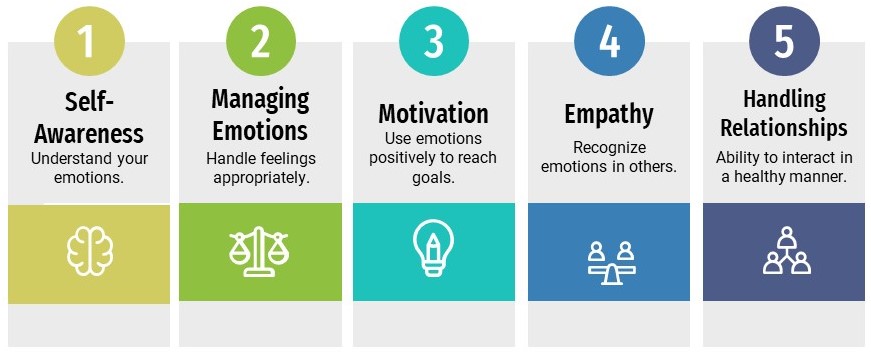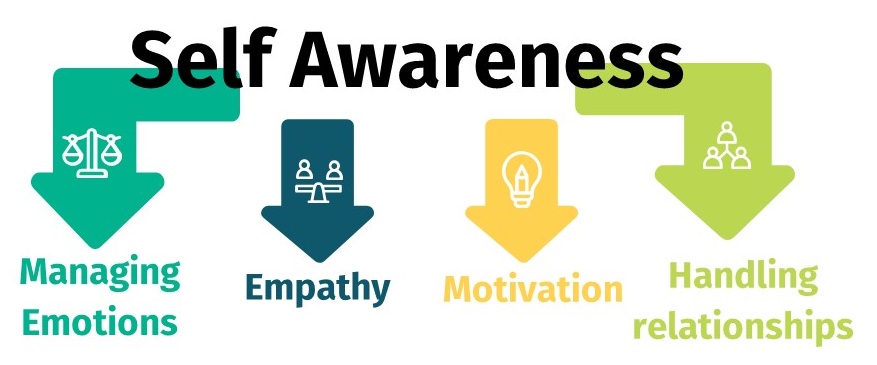
It has been known for a long time now, that having a high IQ is not enough for leading a fulfilling and successful life. You also need to have at least a bit of emotional intelligence. But what exactly is emotional intelligence, and how can you nurture it?
Before we step into a ‘How to Increase Your Emotional Intelligence’ guide, you must first have an idea of how your mind processes emotions.
One body. Two minds.

The first thing you need to know is that we have two minds that coexist with one another. On one hand, we have the Emotional Mind. On the other we have the Mental Mind. Their names are pretty self-explanatory; the emotional mind is in charge of all sensations and emotions, whereas the mental mind is in charge of all conscious and rational analysis. Sort of like a “feelings vs. thoughts” kind of thing.
These two minds are separate, yet they are also interconnected with one another. If one mind becomes disturbed, the other one also suffers the consequences of it.
What happens with the mental mind when your emotional mind is at risk?
If you suffer some emotional trauma, cognitive functions such as memory, motivation, and attention skills can and will be affected. When children experience emotional trauma, their brains undergo significant neurological changes that consequently affect them in the long run. So yes; emotions affect cognition. To gain new knowledge, you must be emotionally at peace.
At the same time, it’s impossible to make proper rational decisions if you can’t be in touch with your emotions. Research shows that people whose region of the brain that regulates emotions has been badly damaged or removed, can’t even make the simplest conscious decisions. This is again telling us how our emotions help us make better decisions… If you learn how to use emotions at your advantage, of course.
Your emotional and the mental minds tend to work in unison for every aspect of your life. You can’t have thoughts without emotions, and you can barely have any emotion without putting them into words. However, there are moments when emotions can be so intense, that it overthrows the mental mind —it becomes a mind of its own.
This is where emotional intelligence steps in. EImotional intelligence can be defined as the ability to keep these two minds coexisting in eternal bliss. Emotional intelligence maintains a balance between them. They must complement each other. But how can you achieve this? Some emotions are so intense, that it’s impossible to keep them “at bay”.
In 1995, Daniel Goleman grouped a set of steps, or skills, that with time and dedication can be developed to nurture emotional intelligence.

But if you think about it, all of these skills revolve around self-awareness. In order to acquire all these skills, you must first work on your self-awareness. Or better said, if you work on becoming self-aware, the other skills might just come along “by default”.

Self-Awareness
Self-awareness is the pillar and the main building block for increasing EI.
Steps into Self-awareness
1. Identify your emotions.
Don’t try to deny your emotions. What exactly are you feeling? Anger? Disappointment? Fear? Try to name the emotion.
It can be difficult to put your emotions into words. It may take years of practice and effort to be able to identify some emotions, but taking the time and dedication to do so can do wonders to your emotional intelligence.
2. Accept and appreciate all emotions.
Look at them as teaching moments; no emotion is good or bad. Emotions are necessary and part of life. Just think, “What is this emotion teaching me about mysef?”
It doesn’t matter if the emotional pain is too intense. Learn to use this emotion to grow. That being said,
3. Try to understand the reason behind each emotion.
What’s the origin? Where does it come from?
By analyzing your emotions, you can find hidden messages from the unconscious. Emotions can leave very valuable messages about who you are and what affects you.
However, because of their instantaneous nature, they may be —at times— unreliable.
For instance, you have emotional memories since before you even started to talk. This means that you may have inexplicable emotions triggered by situations that may not make too much sense.
Likewise, mental memory tends to be associative. This means that some emotions may be triggered by situations similar to traumatic experiences lived in the past. In other words, the mind confuses a situation for another, which then elicits a response. Sort of what happens when we have Post Traumatic Stress Disorder. PTSD makes you react to any situation or event that reminds you of a specific trauma.
On another similar note, some emotions may surge because of false misconceptions about yourself and others. Sometimes your mind plays tricks with you, and deliberately creates inexistent situations that only lead you to suffer. The mind can, indeed, be a real Drama Queen!
This is why getting to know the reasons behind your emotions is key to emotional intelligence. It’s just that the emotional mind doesn’t take the time to “think” if emotion is appropriate or not, or where it comes from. It’s up to the mental mind to observe and understand each emotion. It’s up to the mental mind to merge with the emotional mind.
Two minds work better than one.

Also, when trying to understand your emotions, make sure you distinguish a primary emotion from a secondary emotion. Primary emotions are your first emotional reactions. Sometimes, they are followed by a secondary reaction. For example, anxiety may evolve from fear, and anger may come up from feeling hurt or disappointed.
When this happens, you have to go straight to the source —the primary emotion. If you’re angry, ask yourself the real reason behind that anger. You’ll find out you may be hurt, or frustrated. Once you know the real emotion, then you can make amends with it.
So, what can I do to understand my feelings better?
Having a daily or weekly journal to record your emotions may just do the trick.
Writing helps you go deeper into your emotions. However, if you’re tech saavy, you can also explore apps such as Moodily and MoodPanda that help you track your moods, feelings, behaviors, and thoughts.
It doesn’t matter which means you choose to record your emotions. If you learn to understand them, and identify when it’s “the real deal”, then emotions can be used to guide you straight to where you want to be. They’re like a compass. They are strong indicators that something is going on, and its therefore, guiding you to where you need to go. Always look for ways to understand yourself, to become self-aware.
Another important aspect of becoming self-aware is to understand what’s important for you. This is why you should:
4. Try to define your values and principles.
What do you consider important? What are your standards?
Once you understand your “Code of Ethics”, you can understand your emotions behind them. Being aware of your values also helps you guide your life a certain way. It makes you aware of what to accept from yourself and others, ergo establishing healthy boundaries.
So, how can you define your values?
You’ll notice that good healthy values are achieved internally, such as creativity or honesty, whereas bad values are usually reliant on external events, such as acquiring material success or focusing on constant superficial pleasures.
Internal values are values that only depend on you, which means that the way you feel is only up to you.
On the other hand, when your happiness depends on external events, then you’re pretty much doomed to fail. Because these are things that no matter what you do, may simply not work out.
“When we have poor values, we are focusing on things that in fact make our life worse. But when we choose better values for ourselves, we can focus on things that improve the state of our well-being and that generate happiness, pleasure, and success as side effects.”
Mark Manson
We are not always aware of our set of values. They’re usually unconscious. This survey will help you define what your standards are. Knowing this will help you live a happier and much more fulfilling life.
Knowing why you feel a certain way helps you handle your emotions. For example, if you’re aware that you have a negative perception about yourself or others that makes you feel upset or angry, then you become aware that specific situations may trigger these emotions. Understanding the specific reason behind these emotions is key to responding appropriately.
This means that simply understanding why you feel a certain way already helps you handle the emotion. However, understanding the why is sometimes the first step to some pending inner work. Bottom line is, inner knowledge is power. This leads us to skill number 2:
Managing Emotions
What you do in response to your emotions dictates what emotional intelligence is all about. It’s all about understanding them, especially before reacting.
Look at it this way.
We have a situation that elicits a response (emotion) that then guides your behavior. If at the moment you feel the emotion, and you don’t pause and try to unite the emotional mind with the mental mind, then your preceding behavior may be catastrophic.
You need to find a time-lapse between the stimulus and the response. It’s just better to take some time off and “cool off” before responding to a specific situation —especially when the emotion concerns anger.
Some people think that reacting immediately and impulsively when feeling angry is a healthier response since you are venting out the emotion. This is incorrect. It’s always great to vent our emotions and let them out.
However, if you have no control of your emotions, then they’ll control you. This could make you do or say things that you may later regret. In that case, you’re only thinking with one mind: the emotional mind. In order to be emotionally intelligent, you need to fuse the emotional mind with the mental mind.
So, how can I “cool off”?
First of all, whenever an unpleasant emotion is about to burst or come to life, you need to pause. To achieve this, you need to be very mindful and aware of your emotions.
Secondly, you need to retort to a “safe space”. This is very personal for every person. Just think, what calms you down? Is it walking outdoors? Meditating? Listening to music? Expressing these emotions artistically or verbally?
It’s all about doing whatever calms you down. Once your emotional mind is relaxed, you are able to connect it with the mental mind. You can then react intelligently.
Last, but not least, communicate your emotions healthily and effectively. This is where knowing your values and principles come in handy. Knowing what’s important for you helps you organize your emotions into words that make sense to yourself and others. It helps you express your needs and wants effectively, which will hopefully stop the triggering event.
If said person does not respect your boundaries after explicitly expressing them, then you’ve got to consider removing this person from the equation. Healthy relationships are based on mutual respect.
At the same time, some destructive, but very human emotions, such as envy, resentment, or anger, may arise from situations you can’t control. The best way to “attack” these emotions is by developing emotions such as acceptance and gratitude.
People that tend to be accepting or even grateful for all things —good or bad— tend to respond to shortcomings with high levels of emotional intelligence. But it’s not that simple, because it’s just easier to see the glass half empty, instead of half full.
Empathy
Once you become in touch with your emotions, you develop the ability to see these emotions in others. Growth must start within (self-awareness) to be expanded elsewhere (empathy).
If I can recognize what ignites my anger, or my sadness, then it becomes easier for me to recognize what triggers your anger. Or your sadness. This consequently leads to having healthier relationships.
When you know yourself and what hurts you, you are much more aware of what could hurt other people, and you avoid it. You simply understand what pain, anger, or sadness are, and you try not to inflict it on others.
Understanding your emotions, and letting yourself experience them also puts you in a better position to become a better friend. You become able to connect with the people you care about by accompanying them in their emotions. These emotions do not fill you up with fear anymore. You are now comfortable with them. This is what empathy is all about. It is about being able to feel what others feels in order to help them make sense of their emotion and grow from it.
Those who can read others’ feelings are better adjusted, more popular, outgoing, and sensitive.
Daniel Goleman
On another hand, being perceptive about how others feel, as well as how your actions affect others, may be easily considered as a superpower.
Think about it this way: if understanding the reasons behind your emotions is a way of getting to know yourself, this also means understanding how others feel and why. It’s like having a window to their psyche. This can be very helpful because understanding people close to you gives you the ability to maintain a strong and healthy relationship with them. Which leads you to skill number 3: Handling relationships like a pro.
If emotions are an enigma for you, then you simply can’t understand these emotions in others. This means that you can’t be empathic, and if you can’t be empathic, then your actions could be very harmful towards others. And this is the perfect recipe for becoming very toxic. I can’t stop repeating how self-awareness is everything. It’s the first tile of a domino effect. It’s the beginning of the end.
Now, self-awareness and motivation. How can being self-aware give you the motivation to live a fulfilling life?
Motivation
If you want to increase your emotional intelligence, you need to understand what motivates you to be successful. To achieve this, you have to know yourself well. You need to know which activities you enjoy so much, that you can actually make money out of them. So, love your job, never work a day, right? That’s the motto.
So, bottom line: success comes from enjoying the process, not the outcome. It’s all about working on what you’re good at or working on something you enjoy so much, you don’t mind putting the effort to become better and much more skilled.
“Flow” or Peak Human Performance is a state where you are completely engaged in an activity where you’re very skilled. You are so focused, that the energy “flows”, and whatever you’re working on, or creating, gives you a sense of joy that makes challenging tasks easier. This is productivity at its finest. Emotionally intelligent people tend to channel their energies in this distinctive manner. This is what guides them into a safe pathway to success.
Conversely, emotionally intelligent people tend to defer gratification. They don’t become impatient when they don’t see results, and they most definitely don’t give up when challenges or difficulties come up. They continue working. Even when they don’t feel like it. They also learn to sublimate specific emotions in a way that makes them useful. To find a middle point.

For instance, anxiety or stress. Emotionally intelligent people learn to use anxiety as a source of motivation. They transform anxiety into fuel that drives them straight to success. The relationship between anxiety and performance has an upside-down U. Lacking anxiety means no motivation, whereas too much anxiety hinders performance. Peak Performance is right in the middle.
Other specific qualities that emotionally intelligent people use to guide them into having much more successful lives are: optimism and hope. This means that they expect positive outcomes even when bad or challenging situations arrive. They don’t give up; they keep fighting for what they want.
The pessimist sees difficulty in every opportunity. The optimist sees opportunity in every difficulty.
Winston churchill
To sum up…
Emotionally intelligent people have a wide array of qualities or resources that help them face emotions in an intelligent way:
- Self-awareness. They are very mindful of their emotions.
- The ability to pause before reacting to their emotions.
- Empathy —they can see and understand emotions in others.
- Gratitude —they tend to be accepting or even grateful of all things -good or bad.
- Well-defined set of internal values which they live by. These values are dependent on inner characteristics, such as honesty or creativity.
- Hope and optimism.
If you want to increase your emotional intelligence, you have to start using your emotions as an advantage to succeed. Emotionally intelligent people understand that there are reasons behind each emotion, and rather than seeing them as threatening, they see them as allies. They’re messengers that are there for the sole purpose of teaching them you what you need to learn to grow and become better as an individual.
If you enjoyed this article, then you’ll sure like How to Raise Emotionally Intelligent Children.
Subscribe to learn more about emotional and mental processes!
You can also follow us on Instagram and Twitter!

How to reference this article
Pelaez.S (2020). Emotional intelligence PsycheSpot https://www.psychespot.com/emotional-awareness/emotional-intelligence/
APPA Style References
Goleman, D. (2006). Emotional intelligence. Bantam.
Manson, M. (2016). The Subtle Art of Not Giving a F* ck: A Counterintuitive Approach to Living a Good Life. Macmillan Publishers Aus.
Positive Revolution. (2017, February 2). Documentary on Emotional Intelligence: What are your emotions not telling you? MUST WATCH [Video]. YouTube. https://www.youtube.com/watch?v=B-ieqbSSrnY
Images by:
Mohamed Hassan from Pixabay
